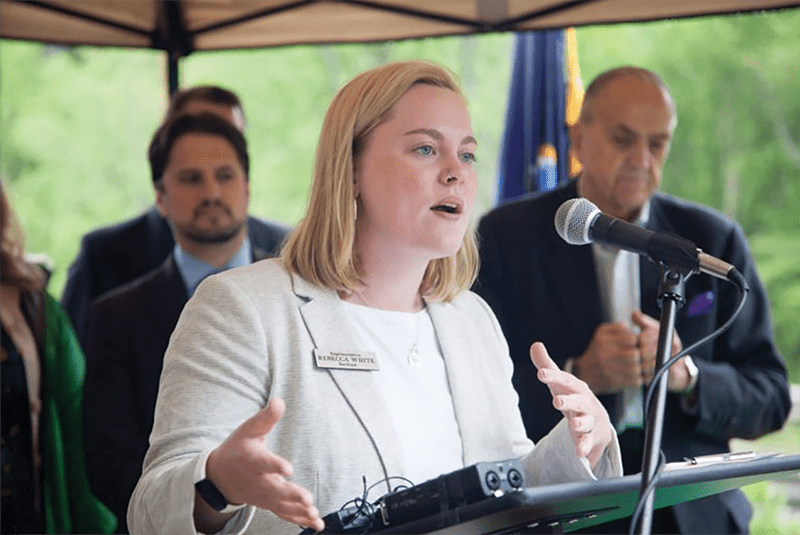Staff report
Sen. Becca White, D-Windsor, was joined by nine co-sponsors, including Sen. Alison Clarkson, D-Windsor, and 13 other representatives on March 14 to introduce S.125, to decriminalize prostitution.
Rep. Taylor Small, P/D-Winooski, is the lead sponsor of the similar House bill, H.372. Each bill has been referred to its chamber’s Judiciary Committee.
“Regardless of how one feels about prostitution personally, I hope we can all agree that criminalizing it is wrong for so many reasons,” said White in a press release. “Our laws should be rooted in reality and data, instead of ideology. This bill reflects Vermont’s commitment to personal and bodily autonomy and individual liberty.”
This bill would repeal the state’s prostitution laws that prohibit indiscriminate sexual intercourse and consensual engagement in sex work for hire by adults.
“Data has consistently shown that the criminalization of voluntary sex work is associated with increased risk of sexual and physical violence from clients, domestic partners, or other parties; increased risk of HIV and other sexually transmitted infections; and a disruption of sex workers’ support networks, workplace safety, and risk reduction strategies, resulting in reduced physical and emotional health for sex workers,” according to the bill.
The bill cites a 2018 study from Johns Hopkins Bloomberg School of Public Health analysis of 130 studies which found the criminalization of sex work is harmful.
“Criminalization compromises access to resources, endangers public health, and allows violence against sex workers to go unchecked,” said Small. “Criminalization also fails to protect trafficking survivors. Decriminalization is a well-researched, practical, and simple step we can take in the fight against trafficking, while we work to address the nuanced causes of trafficking and invest in meaningful resources that support victims.”
The press release said the World Health Organization, the Global Alliance Against Traffic in Women, Human Rights Watch and other human rights groups support the decriminalization of consensual adult sex work in order to address human trafficking worldwide.
“We all share a common goal of protecting our most vulnerable residents from trafficking, violence, and exploitation and it’s clear that criminalizing and stigmatizing the sex trade does not do this,” said Windsor County State’s Attorney Ward Goodenough, who is Alison Clarkson’s son. “Those of us trusted with the power to make, change, and enforce laws have a duty to pay attention to evidence that shows us when we can do better. Modernizing our prostitution laws only reinforces our commitment to fighting trafficking and exploitation.”
Henri Bynx, co-founder of The Ishtar Collective, Vermont’s only organization run by and for consensual adult sex workers and survivors of human trafficking, also supported the bill.
“Through the decriminalization of consensual adult sex work, Vermont has a powerful opportunity to put its values into action,” Bynx said in the press release. “Those values are autonomy, community safety, and the recognition of the inherent dignity and humanity of all individuals. The best way to keep somebody trapped in a system of oppression is to keep them in a cycle of criminality and stigma. I want to get old, and I want to see my friends get old. I want us to live and thrive not under scrutiny, but in mutual respect and real community care.”




